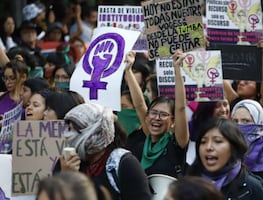Más Información

Secretaria de las Mujeres busca disminuir feminicidios con promotoras de derechos; creará línea para atención a víctimas

Diputada María Teresa Ealy Díaz promueve unidad y tradición en la CDMX; celebra Día de Reyes en la MH

Comisión de Defensa en San Lázaro avala reforma sobre ascensos para médicos militares; busca incentivar especialización

Buscan vinculación a proceso de hotelero por fraude en Baja California Sur; afectados fueron secuestrados al exigir pago

Senado alista mecanismo para garantizar elección judicial tras suspensión del Comité del PJF; Noroña acusa sabotaje
Ramón Castro, a lifelong rancher and farmer who bore a strong physical resemblance to younger brother Fidel Castro, has died, Cuban state media announced Tuesday. He was 91.
Widely known by his nickname "Mongo," the white-bearded Ramón Castro preferred tending crops and livestock to the revolutionary political life embraced by his younger siblings Fidel and Raúl, who replaced Fidel as Cuba's president in February 2008.
Two years older than Fidel, Ramón was long used to getting double-takes from people who insisted he looked just like his famous brother. At times, Ramón was said to reply that because he was older, Fidel actually looked like him.
Ramón, Fidel and Raúl were the second, third and fourth children of Ángel Castro, a Spanish-born rancher, and his second wife, Lina Ruz. Ángel Castro also had two other children from a previous marriage.
The three brothers attended Roman Catholic schools in eastern Cuba, where their teachers complained about their pranks and trouble making, prompting Ángel to pull them out of classes for some time.
Once grown, Fidel and Raúl headed off to Havana for studies, then the business of launching a revolution against dictator Fulgencio Batista, who seized power in a 1952 coup.
But Ramón Castro was content to remain in the village of Birán in eastern Cuba, where he helped his father with the family business.
Nevertheless, Ramón remained in contact with his siblings. He wrote letters to Fidel in prison when he and Raúl and other followers were arrested after their unsuccessful 1953 attack on a military barracks that launched their armed struggle. Sometimes along with the correspondence, Ramón sent along a ham or a box of cigars.
According to letters from that period, Fidel asked Ramón to assure their parents that prison was not "a horrible and shameful idea. ... When one's motives are lofty and great, then it is an honorable place."
After Fidel and his followers established their rebel stronghold in Cuba's eastern mountains, there was at least one recorded instance of Fidel visiting the family ranch, where he feasted on a turkey that Ramón had kept frozen for months in hopes of such a visit.
Following the 1959 triumph of the Cuban revolution and Fidel's subsequent rise to power, Ramón often worked as a consultant for the government ministries of agriculture and sugar. In the early 1960s, he oversaw sugar production in eastern Cuba, where he helped increase output.
Ramón founded several state companies, including ones that handled the transportation of sugar cane and the production of oranges. He also was involved in agricultural research.
Although he wielded little government power, Ramón nevertheless was a founding member of the Communist Party of Cuba and served as a deputy in the country's parliament, the National Assembly.
Little was known about his private life except that he was born on Oct. 14, 1924, had been married and had at least two sons, Ramón Omar Castro and Ángel Castro.
Being the president's brother often brought him into contact with high-profile visitors, including American film director Oliver Stone, who met with both Fidel and Ramón during a 2002 visit.
More recently, Ramón befriended rancher John Parke Wright, of J.P. Wright & Co. of Florida, during the American's recent visits to negotiate sales of U.S. livestock to the communist government. Wearing big cowboy hats, the pair rode horses and inspected cattle at the Niña Bonita ranch in the western province of Piñar del Río.
Although Fidel quit smoking cigars in 1986, Ramón maintained the habit that he picked up from his father when he was just 12.
"Is it true that he never smoked again?" Ramón asked during a 2002 international cigar festival about his younger brother's former love of the island's world-famous tobacco. "As for me, I haven't given it up."
Ramón liked to boast about his family's longevity. Their father lived until age 82, and there reportedly was at least one aunt who lived past 100.
"It seems that we have a good genetic mix," Ramón said in late 2004, expressing confidence that Fidel would quickly recover after a fall, which in fact he did.





